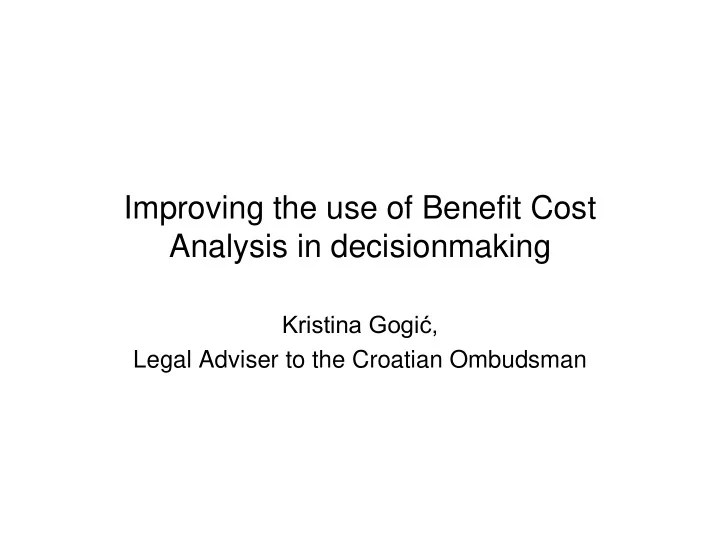

Improving the use of Benefit Cost Analysis in decisionmaking Kristina Gogić, Legal Adviser to the Croatian Ombudsman
BCA is simply rational decision - making • BCA is yet controversial regulatory tool (people use it every day – projects, programmes, policy proposals, any kind of economic decision, etc.) • BCA is a relatively simple and widely used technique for deciding whether to make a change • BCA is very important in political, governmental decisions • An individual might be satisfied with an emotional or ad hoc response; Governmental body must be very careful and cannot rely on such reactions • BCA is often use by Governments - successful decision – when total expected costs are less than total expected benefits - results with the most profitable option * BCA might be the most efficient decision framework; in efficiency terms
• Each analysis is different and demands careful and innovative thought • If there is a single decision – maker than an analysis from one point of view is often adequate (individual aproach in decision-making) • If the interests of more than one person or group are affected, the several analysis might be necessary (dualistic approach in decision-making)
BCA example: Governmental decision - Croatia • Before recession – Croatians citizens had tax refund as a benefit for: - health services - mortgage loan - life insurance, etc. • When Govermental costs became too high they made decision to abolish this benefits (and some others) • Results: - citizens are not satisfied with that decision - citizens think that Government could abolish some other benefits or reduce other costs in their jurisdiction • Final result: - Government could fall on this decision (not only because of that decision, of course); maybe advisers didn’t make the best BCA (the fact is that decisions are ussualy made in a situation of some uncertainty; you can never be completely sure what tomorrow will bring)
Improving the work of analyst adviser in this case • The analyst adviser who wants to provide advice to his or her Minister or Prime Minister in this case might need to know: - how the project would look from general social point of view (all costs and benefits to Croatians), than from: - fiscal point of view - provincial point of view - local point of view, also maybe some others (BCA analyst adviser must be very careful; he/she can not offer an ad hoc response) • The fact is that the final decision make Minister or Prime Minister, and he is responsilble for the consequences of that decision (but in Croatia we usually think on the resposibility of the Government in general, not only Prime Minister) • When a Government analyzes many possible investments over time, it may have a problem deciding how to treat general costs that aren’t specific to a particular project - adviser also must be very careful in this analysis, if he wants that Government make the best decision (such costs are sometimes called overhead costs or general and administrative costs (fixed costs))
Decisionmaking • Avoiding “jumping to conclusions” • Understanding the Theory - reality and facts - selected reality - interpreted reality - assumptions - conclusions - beliefs - actions • How to use the Theory? Questions: - is this the “right” conclusion? - why am I making these assumptions? - why do I think this is the “right” thing to do? - is this really based on all the facts? - why does he believe that?
THANK YOU ON YOUR ATTENTION! E-mail: kristina.gogic@ombudsman.hr
Recommend
More recommend